Dell Studio 14z: Thin and Light Done Right
by Jarred Walton on October 20, 2009 3:00 AM EST- Posted in
- Laptops
Battery Life without Killing Graphics
We run many scenarios for our battery life tests. Since most the 14z doesn't include an internal optical drive, we will focus on DivX HD, x264 HD, Internet, and idle battery life. The GeForce 9400M definitely helps in video playback with complex H.264 codecs. We measured CPU utilization for both 720p and 1080p x264 videos and Windows Media Player Home Cinema; the maximum CPU usage for 1080p was only 12%, and average CPU use was just over 5% for both 720p and 1080p. Interestingly enough, 720p DivX decoding actually required slightly more CPU time (8.5%).
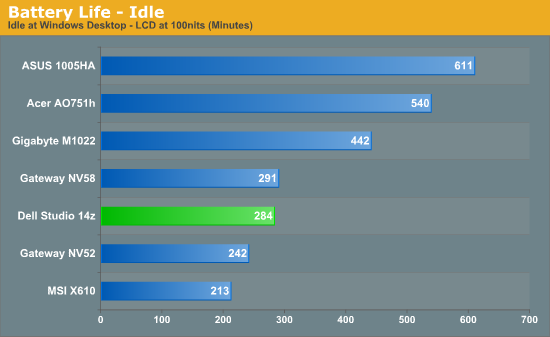
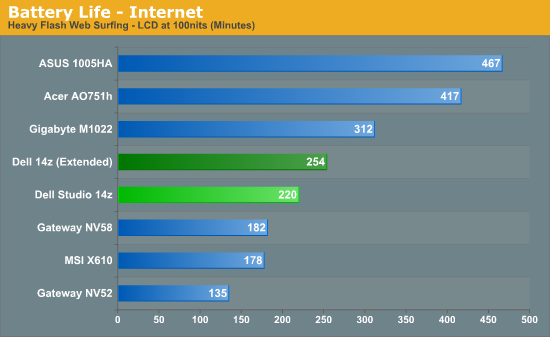
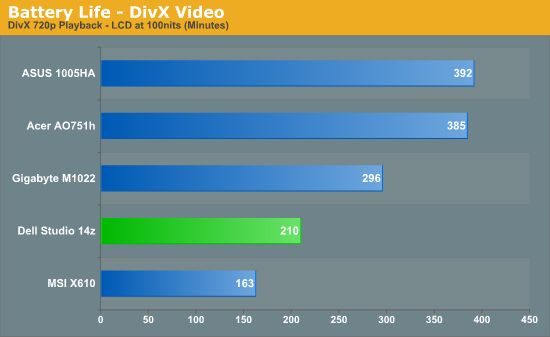
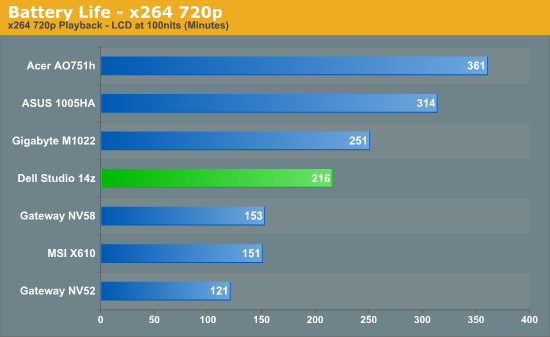
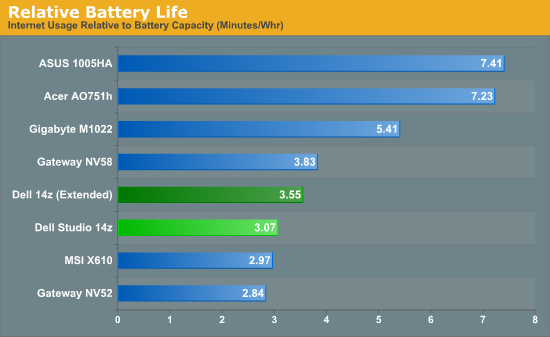
Compared to other laptops, the Studio 14z delivers reasonable battery life. However, we are using the larger 8-cell battery (71.6Wh/74Wh), and even in our idle test we didn't come anywhere near the 6.5 hours of battery life Dell lists on their website using the default power settings. In order to get to 6.5 hours, you need to enable the "Dell Extended Battery Life" option, which switches to the "Power Saver" profile, disables the Glass UI, and makes a few other tweaks.
It looks like the Studio 14z should offer comparable battery life to the standard MacBook, at least with the 8-cell battery, but that means the MacBook is making better use of its 60Wh battery. The MacBook Pro remains out of reach of similarly equipped Windows laptops (for now). The Studio 14z does extremely well in the Internet and x264 decoding tests, where it beats the Gateway NV58 by over 20% and 40% respectively. The Gateway NV58 has a smaller battery, however, and in relative battery life the NV58 still outperforms the 14z in Internet tests.
Incidentally, battery life while gaming remains acceptable: we were able to run 3DMark06 in a loop for just over three hours (188 minutes), with essentially the same performance as we achieved on AC power. Even with the smaller 56Wh battery, users should still be able to get over two hours of gaming, just shy of three hours of Internet surfing (depending on web site complexity), or about 2.5 hours of HD video playback. That's not as good as the standard MacBook (3.1 hours of video playback and web surfing on a 45Wh battery), but it's no longer a complete blowout.
Power Requirements
As a corollary to the battery life tests, we also performed measurements of power requirements using the AC adapters and a Kill-A-Watt device. These numbers are only accurate to the nearest Watt, so a difference of 1W (i.e. from rounding) could obscure up to a 12% actual difference in power requirements. Also note that power requirements change when you switch to DC power, and power supply (power brick) efficiency comes into play when using the AC adapter, so the battery life tests are a better indication of true power requirements.
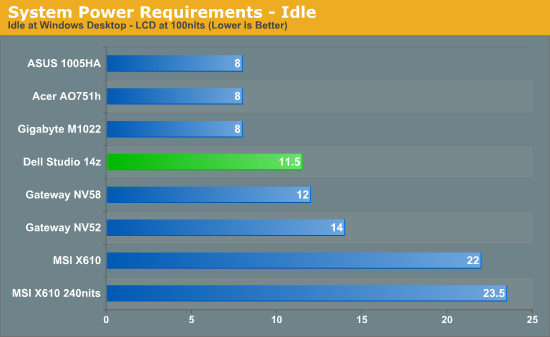
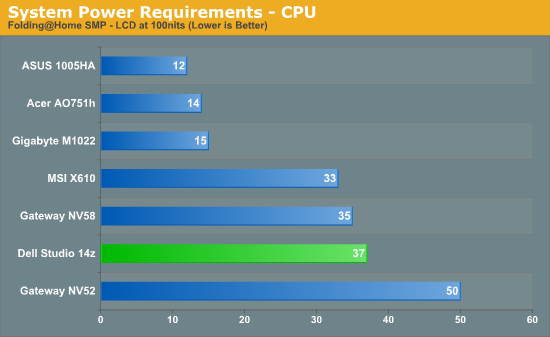
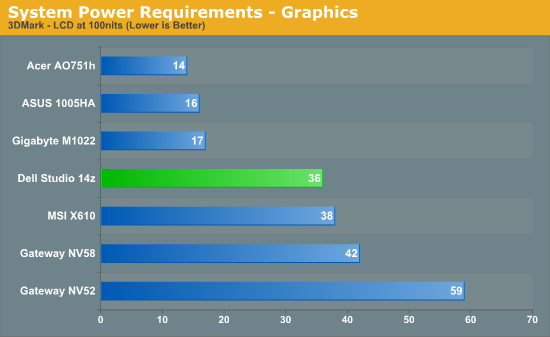
The Studio 14z has impressive idle power requirements, coming in just below the NV58. When we put a load on the CPU, however, the lower clock speed on the T6500 in the NV58 puts it back in the lead. Worth noting is that the T6500 has a TDP of 35W compared to 25W for the P8600, but all indications are that it actually doesn't use as much power. TDP isn't a true measurement of power requirements!? Say it isn't so…. Perhaps more interesting is that in our simulated gaming test (3DMark at native LCD resolution), the Studio 14z ends up using less power than any of the other laptops. It's still a far cry away from the netbooks, but it's nice that users can get what appears to be the best current IGP solution without compromising on power requirements.










57 Comments
View All Comments
DominionSeraph - Thursday, October 22, 2009 - link
System monitor in XP will show you percentage of C1, C2, and C3 time. (can't check vista right now)hybrid2d4x4 - Thursday, October 22, 2009 - link
I too would like to see an investigation of why the Macs get better battery life in OSX, and if it turns out that it is the hits on the HDD (I suspect you're right on this one) and unnecessary background processes, if there are any tweaks that we can perform to squeeze the most out of Windows.gstrickler - Sunday, October 25, 2009 - link
I can't explain why Mac OS X is so much more power efficient, but keep in mind that Apple designed their own chipsets for 20+ years and co-designed the PPC for 10 years, all while developing their own OS. They've undoubtedly gained some insights into the operation of complete systems that no other company has (IBM might have, but they would not have shared that with MS without a big payoff). Sun has similar background, but never needed to be that concerned about power since they make high performance machines and don't make laptops.I am surprised that Apple has been able to maintain that advantage since moving to Intel CPUs and Nvidia chipsets, apparently a lot of it is in the OS design.
Interitus - Tuesday, October 20, 2009 - link
I've owned this laptop for about 4 months now. It really is a nice laptop. Very light, my config with almost everything set up for low power lasts ~6 1/2 hours on battery as long as I'm not running video or doing anything graphic or CPU intensive. For surfing the web and typing up papers and the like for school, this laptop is perfect.There are a few minor issues I've found with the laptop:
1) the touchpad isn't the greatest as someone mentioned. It's really buggy, but if you leave it at the default settings it's not that bad. The issues start to arise when you change settings like sensitivity and click speed.
2) DO NOT expect to carry this laptop around in your backpack and not treat it with respect. Mine has a clearly visible line on the battery (from the inside of the laptop between the monitor and the keyboard) where it appears to have been squished together too tightly and the lip of the screen has scratched the battery. Purely cosmetic, but still annoying considering I paid $1100+ for my setup.
3) There is a common issue with screen flickering. Mine has it, but it's not enough to annoy me or make me want to have some idiotic Dell repair person compromise the integrity of the laptop by tearing it apart to fix it.
4) My mother purchased one of these after seeing mine, and as a lot of people reported, the battery rattles a bit in its place. Mine doesn't exhibit this behavior.
Those things aside I love this laptop. Most of them are minor issues too, so don't let it put you off of buying one. Just get a warranty to cover issues like those.
My config was $1100'ish with a 2-year complete care package from Dell, pretty good price for a Macbook minus the OS.
Don't understand the choice to solder 1GB to the board, kinda stupid from my point of view. 4GB sticks are still ridiculous in price.
nysportz - Tuesday, October 20, 2009 - link
I thought the MacBook comparisons were interesting. FYI, Apple released a new MacBook today weighing 4.7 lbs and advertising 7 hours of battery life. At $999, this is pretty competitive with the Dell.I say this as an impartial observer (and as someone shopping for a laptop in this size and price range).
JarredWalton - Tuesday, October 20, 2009 - link
We measured 3.1 hours with the MacBook using a 45Wh battery under our most stressful test scenario, so the new MacBook with a 60Wh battery will almost certainly hit 4+ hours worst-case, and typical battery life is likely to hit 6+ hours as advertised. The difference of course is that you run OS X vs. Windows, and you pay $1300 vs. $1000. If battery life is important to you and you don't mind ditching Windows, Apple is very much still in the lead.gstrickler - Tuesday, October 20, 2009 - link
How do you get $1300 for the new MacBook? Base price is $999 with 2GB RAM and a 250GB HD. Take it to 4GB and a 320GB HD (closest config you can get to the Dell you 14z you tested) and you're at $1149.And the MB includes an internal optical drive in that price. Still comes in at 4.7 pounds and 4-7 hour real battery life. Of course, the Dell does have a 14" display, ExpressCard 34 slot, and a slightly faster (2.4 vs 2.26 GHz) CPU, so it's not a complete win for the MB. Both sound like nice machines, with similar features and similar prices.
JimmyJimmington - Tuesday, October 20, 2009 - link
Look at the baseline mac at $1000, vs the $960 14z that I described. It costs a bit more and you get a smaller screen with lower resolution (which is how they squeeze out the comparable battery life), less RAM, slightly heavier, slower proc, slower hard drive, no esata, and mini display port (I mean minidisplay port, are you kidding me?). The 14z wins on hardware alone.You're paying for the OS, no question about it. If you want OS X though, just buy a mac.
gstrickler - Wednesday, October 21, 2009 - link
Dell specs the 14z at 4.6 pounds with the 6 cell battery, not the 8 cell, as you claim in your config, so the MB is in fact slightly lighter then the Dell with the 8 cell battery. Of course, we're only talking about a couple ounces either way.Then again, the MB does include an internal optical drive in that weight, and gets better battery life, which is a clear win for the MB.
Your ~960 price was "with a student discount", try comparing it to the price of a the MB with a student discount, not to the retail price. Since you didn't specify the size of your HD or RAM, I can't come up with a "retail" price for you system, but I just configured a Studio 14z with 3GB RAM, 320GB 5400 RPM HD, P8600 CPU, 8 cell battery, and the standard display, it's $969. The comparable MB is $1149 with 4GB RAM. BTW, that configuration is the one that gives the biggest advantage to the Studio 14z. Change the HD size or the RAM size, or and optical drive to the Dell, and the difference is smaller. The price comparison you gave is meaningless, if you qualify for the student discount on one, you'll almost certainly qualify for a student discount on the other.
The "best" comparison of "comparable" machines would be a MB with 4GB RAM, 320GB HD, and 3 year warranty for $1389. The MB includes 802.11n, bluetooth, optical drive, and Mac OS X.
vs.
Dell Studio 14z with 5GB RAM, P8600 CPU, 320GB (5400 RPM) HD, 802.11n, internal bluetooth, standard display, 8 cell battery, Optical drive, Win7 Home Premium, and 3 yr warranty for $ 1544.
Yes, the 14z has a slightly faster CPU and 1GB more RAM in that configuration, but Vista is more CPU and RAM intensive than Mac OS X, so they're very similar. The 14z also includes an eSATA port, 1394a port, ExpressCard 34 slot, and an HDMI port, but you're paying an extra $155 as well.
There is almost no difference in the power draw of a 13.3" vs 14" display, nor does a slightly higher resolution display draw notably more power. That is not the reason the MB gets better battery life. The reason is better power management in Mac OS X vs Windows, and possibly use of some lower power components.
Yes, Mini Displayport, get used to it. Displayport is the way the market is moving (which is why Dell includes it on the Studio 14z), and Mini Displayport is part of the Displayport standard, it's just a smaller connector, great for small laptops.
JimmyJimmington - Wednesday, October 21, 2009 - link
The starting weight with the 6-cell battery on the 14z is 4.3 lbs. according to Dell. I weighed the machine myself with the 8-cell battery and it's 4.6 lbs. so I don't know where you're getting your information from, the dell is lighter than the smaller mac.Your "comparable" specs make no sense at all. You're just pulling prices out of your ass.
Again, look at the baseline white plastic mac, $950 with a student discount vs. mine which was $960.
I didn't get the 320 gig hd, both the baseline mac and my 14z have the 250 gig hd, not 320. I opted for the faster 7200 rpm for $50 extra. So if you want to be as comparable as possible, itd be like $910 vs. $950
I will even give you that the standard 2 gigs of RAM on the mac is comparable to the 3 gigs on the 14z. Upgrading either is overpriced and useless.
The standard warranty for dell and apple are 1 year, so I don't know why you're throwing that into the comparison.
I don't know why you think displayport is the future either. Most TVs, at least all the ones I've seen, come with HDMI, that's the universal standard.
And it's not Vista, it's Windows 7. It came with a free upgrade to 7 and it can't even be bought with Vista anymore.
Like I said before, the 14z has superior hardware at a lower price. As always, you buy apple laptops for the OS.